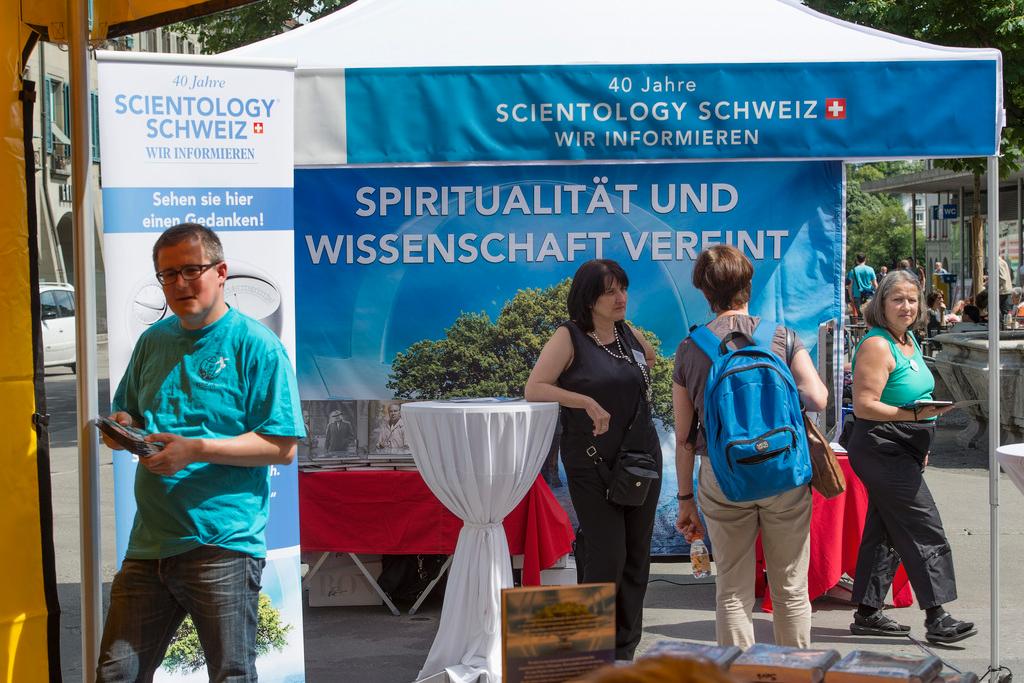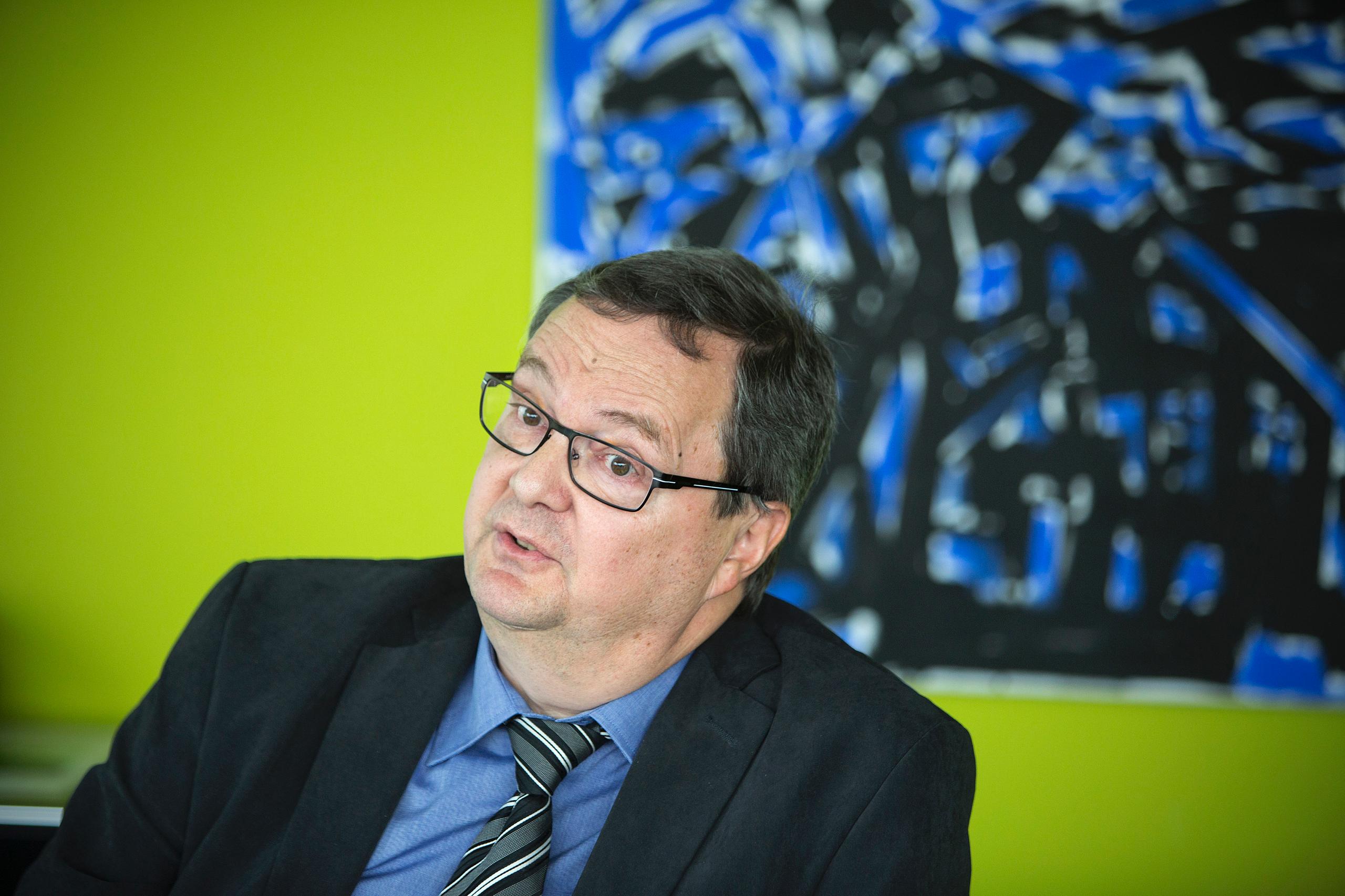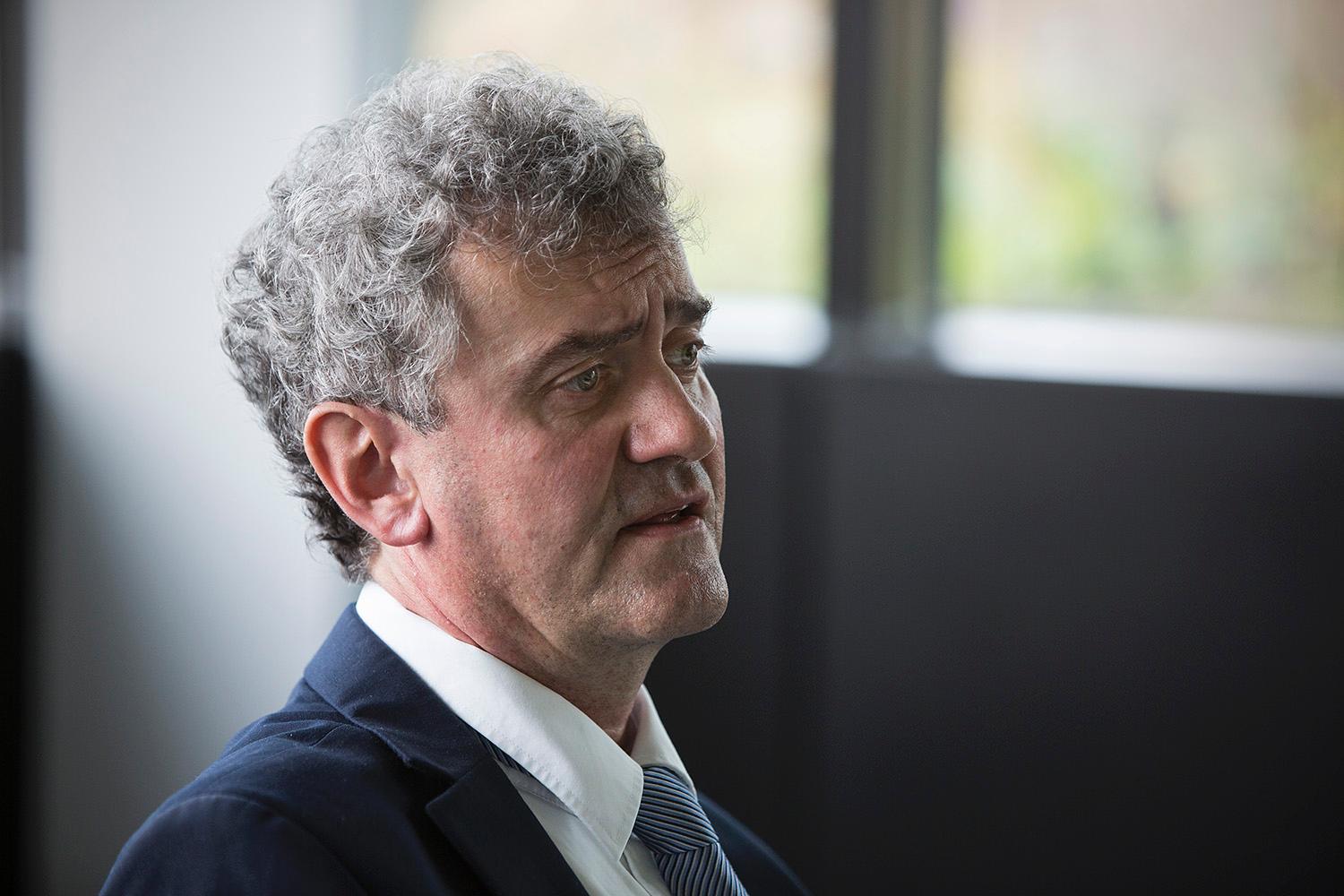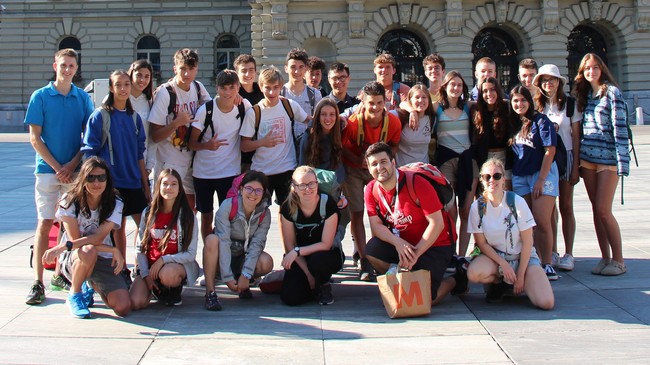
Questioning the role of Scientology in Switzerland

Forty years have passed since Scientology was established in Switzerland and the controversy surrounding the organisation has abated somewhat but the organisation still has its detractors. In a joint interview, swissinfo.ch facilitates a debate between the most senior Swiss scientologist and a renowned expert on sects.
Some see Scientology is a totalitarian and elitist business; others maintain it is an applied religious philosophy.
Jürg Stettler, press officer for Scientology SwitzerlandExternal link and Germany, is adamant: Scientology is a religion, and not a sect. “Only opponents use the term ‘sect’ as they want to ostracise these groups.”
Georg Otto Schmid of the Protestant information centre RelinfoExternal link sees it differently: “Scientology is structured like an extremely hierarchically organised business. There is a complete ban on criticism and pronounced elitism.”
swissinfo.ch: How do you know that criticism is banned?
G.O.S.: Former Scientologists have told me that criticism was a no-go. Those who criticise the organisation are thought to be hiding something. Once spotted, these critics have to undergo a security check and are treated until they stop criticising.
J.S.: Mr Schmid campaigns against minority religions like an apologist. I guess this is the job the Protestant Church uses him for. A lot of the things he says are not true.
G.O.S.: The Protestant Church isn’t ‘using’ me. I am employed by an independent organisation, which is supported by the Protestant Church in German-speaking Switzerland. Our organisation is responsible for religious consumer protection and acts in the interests of consumers. We give advice to people who want to leave Scientology. Scientology is an anti-democratic organisation, which is the reason why it is viewed so critically in many countries.

J.S.: This is ridiculous. We constantly invite people to our Church and organise events with critics. We are open to criticism, which is welcome and absolutely not banned.
swissinfo.ch: How is Scientology viewed in Switzerland?
J.S.: We have to be honest here: Scientology is controversial, which is partly the fault of a few critics, who repeatedly appear in the media. However, we enjoy more and more acceptance and have good contacts to universities and religious scientists. Compared to 15 years ago, we have made huge progress.
swissinfo.ch: No other organisation is as much criticised by the press and public as Scientology is. Why?
J.S.: This question could be put to the media. Some media outlets have made sure that there has hardly been any positive news about Scientology for the past 30 years. At the beginning of October, for example, the European Court of Human Rights in Strasbourg decided that Scientology should be registered as a church in St Petersburg. The Catholic News Agency was the only news wire to report this development in Switzerland.

G.O.S.: The reason why Scientology gets so much attention is the fact that it spends a lot of money on advertising and uses celebrities for publicity. People leaving the inner circle definitely get attention. Another fact is that Scientology is not waiting for the end of the world like Jehovah’s Witnesses; it wants to take over the world. That’s why the media has taken on this watchdog role, and rightly so.
J.S.: Of course, we advocate for a better world, however, it’s ridiculous to say that we are trying to ‘take over’ the world.
swissinfo.ch: We were unable to find an ex-Scientologist to talk to us, not even anonymously. They said they were afraid. How do you explain that?
J.S.: We haven’t had any recent problems with people who dropped out in the past few years.
G.O.S.: People, who have recently left Scientology, are scared of getting into trouble with them. They are also worried about endangering the friends they made during their time there. As long as they don’t express their criticism openly, these ex-members are allowed to keep in touch with Scientology members.
Talking publicly about your Scientology background could also have a negative impact on job hunting. Human resources prefer people without such a background, as members of radical organisations are often wrongfully considered to be unstable.
swissinfo.ch: Do long-term members, who want to leave Scientology, have to sign a secrecy agreement?
J.S.: Of course, as an active member I had to sign a confidentiality agreement. However, it’s not true that I am not allowed to say anything about my experiences with Scientology. I wouldn’t tolerate that. By the same token, I wouldn’t be allowed to talk about confidential internal matters.
swissinfo.ch: Is there a stereotypical Scientologist?
J.S.: No. Scientology members are from all walks of life: teachers, housewives, businessmen, and so on. Scientology used to be called a youth sect, like Hare Krishna. Nowadays, the average age of a Scientologist is 40 years.

More
‘I would never let anyone tell me what to think’
In Switzerland, there are no celebrities such as Tom Cruise or John Travolta, but due to the controversy around the organisation leading figures don’t like to talk about their affiliation in public.
G.O.S.: People joining Scientology are not usually looking for something spiritual; they often have problems. Scientology claims to have a solution for everything. After having attended a communications course, the newcomers go on to the auditing (some sort of counselling), where they may talk about stuff they have never told anyone, which can be a huge relief. But then pressure kicks in and they are constantly urged to make money.
swissinfo.ch: Doesn’t Scientology profit from weak and unstable people?
J.S.: This is yet another one of these clichés. Some of our members are people, who are well established in society and have families, and are simply looking for greater meaning of life. You are suggesting that our members are unstable people, but I think that being a Scientologist actually requires a lot of backbone.
swissinfo.ch: What about people, who don’t have the necessary funds? Can they attend the courses?
J.S.: Yes. Even though we finance ourselves through courses and auditing, people who don’t have the money can become full-time members and work for Scientology. In return, they can attend the full range of courses free of charge. We expect some sort of support – either financially or through work.
G.O.S.: There are two groups: first of all there are the employees, who attend the courses free of charge and work for a small wage. They have to keep statistics on a weekly basis and make more money. The other group are the people, who pay for the courses and keep their normal jobs. The staff generally puts pressure on them to book as many courses as possible and if need be take out a loan for it….
I also know Scientologists, who have been with Scientology for 30 years and are content with it as they are resistant to this pressure and may only attend one course per year.
J.S.: Only three to four of the 120 active members in Zurich look after the revenue we make with the courses.
Scientology Switzerland
Scientology has been active in Switzerland for 40 years. According to the organisation, 300 fulltime members look after 5,500 Scientologist in 11 branches.
There are five Scientology churches and six missions in Switzerland. In Zurich, there are supposedly 120 fulltime members, closely followed by Basel and Lausanne with 70 fulltime members each. Next year, a big centre is due to be built in Basel.
The Protestant information centre relinfo.ch estimates the number of active Scientologist in Switzerland to be fewer than 1,000.
(Source: Scientology/relinfo.ch)
swissinfo.ch: What relationships do Scientologists have to friends and family, who are not members?
J.S.: With couples it sometimes happens that only one spouse is a member. This can work without problems unless the partner is absolutely against Scientology. We cannot force the partner to join – we are talking about a spiritual path and not about an adult-education course.
G.O.S.: As long as non-members don’t criticise Scientology, they are allowed to be in touch with members. Critics are seen as ‘oppressors’ and are not allowed to be in touch.
J.S.: This is not true. Critics are not automatically described as oppressors.
swissinfo.ch: Scientology also advocates for human rights, drug prevention and schools. Why?
J.S.: Scientology has always been socially engaged. We are not a meditation club; we strive for a world without war, crime and madness.
swissinfo.ch: There is nothing wrong with that, is there?
G.O.S. There is no doubt that advocating for human rights is a good thing. However, advocating for human rights and not practicing them at your own doorstep is hypocritical.
Scientology wants to change society and ‘heal’ homosexuals and have never distanced themselves from this attitude.
J.S.: In psychiatry, homosexuality used to be a mental illness up to 1967. We cannot blame Scientology for statements from the 1950s. The bible can also be brutal. There are no same-sex marriages in Islam, Buddhism and Hinduism.
Religion or sect?
As opposed to the US, Spain, Italy and Sweden, Scientology is defined as a sect rather than a religion in France.
In Germany, the Federal Agency for the Protection of the Constitution monitors this organisation. This monitoring is due to be reduced.
Switzerland does not recognise religious groups on a federal level. Policy on religion is managed by the cantons. Most cantons differentiate between officially-recognised state churches (of which there are four) and simple associations. No canton treats Scientology as a state church (source: G.O. Schmid)
The status of Scientology is controversial in Switzerland. Various authorities and courts treat the organisation as a religious community, even though it hasn’t been granted tax exemption. (Source: J. Stettler)
swissinfo.ch: How come parents, who send their children to ZIEL schools, are not told that the schools belong to Scientology?
J.S.: They don’t really belong to Scientology, even though the principals are Scientologists. The parents are informed that the learning methods are based on the teachings of L. Ron Hubbard, the founder of Scientology.
G.O.S.: Hubbard’s studying methods are part of this education and represent Scientology’s concept of humankind. As long as they are transparent, schools with a worldview are allowed in Switzerland.
swissinfo.ch: Has Scientology changed in the past 10 years?
G.O.S.: I don’t think much has changed. It’s an incredibly dogmatic organisation, which still follows L. Ron Hubbard’s teachings from the 1950s and 1960s. If it doesn’t discard these ancient teachings soon, it will become obsolete in no time.
J.S.: One could also argue that the Protestant Church, of which I am still a member, has not moved on as it’s based on the bible. Every religion has its basic writings and a founder. I don’t think you will find a religion that changes its dogma every 10 years.
Scientology Switzerland has definitely become more moderate. It hasn’t been sued by critics for years; and in terms of taking out loans we have also become more cautious. It occasionally happened in the 1990s that some of our members took out loans they could not really afford.
swissinfo.ch: Can you see anything positive in Scientology?
G.O.S.: Every community has its strengths. Scientology’s initial courses can boost self-confidence. Another positive thing is that traumas from the past are dealt with. The idea is great, however, the practice is out-dated.
swissinfo.ch: Is there anything you would criticise about Scientology?
J.S.: We have to become more transparent, also internally. We should not isolate ourselves, give out more information and be more open.
Scientology
L. Ron Hubbard (1911-1986) founded ScientologyExternal link in the US in 1952.
Scientology’s goal is to create a world without war, crime and madness.
The core of its philosophy is that the immortal soul of every person is influenced by traumatic experiences, which can be repaired through Scientology technologies.
(Translated by Billi Bierling)

In compliance with the JTI standards
More: SWI swissinfo.ch certified by the Journalism Trust Initiative
















![The four-metre-long painting "Sonntag der Bergbauern" [Sunday of the Mountain Farmers, 1923-24/26] had to be removed by a crane from the German Chancellery in Berlin for the exhibition in Bern.](https://www.swissinfo.ch/content/wp-content/uploads/sites/13/2025/12/01_Pressebild_KirchnerxKirchner.jpg?ver=cb688ed5)
















You can find an overview of ongoing debates with our journalists here . Please join us!
If you want to start a conversation about a topic raised in this article or want to report factual errors, email us at english@swissinfo.ch.